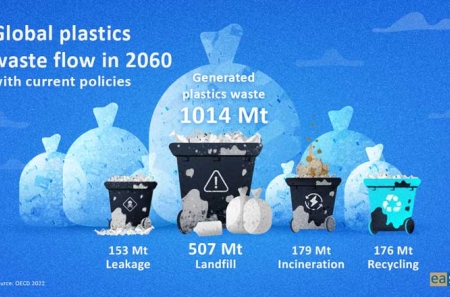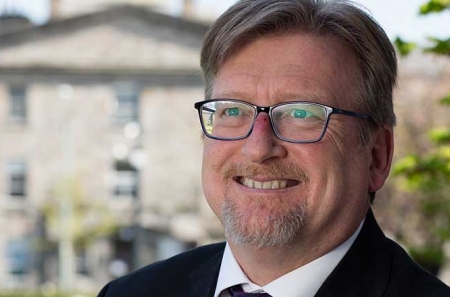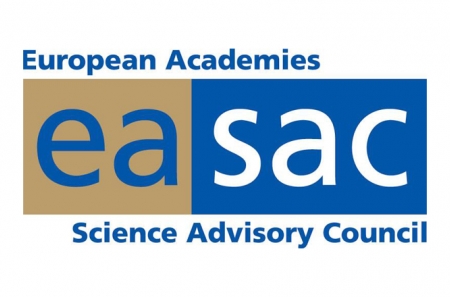
Royal Irish Academy-Royal Society International Exchange Cost-Share Programme 2018 awardees
10 October 2018The 2018 awardees are Prof Ken Duffy (National University of Ireland Maynooth) and Dr Paula Bourke (Dublin Institute of Technology).
The Royal Irish Academy and the Royal Society are pleased to announce the successful awardees under the 2018 Royal Irish Academy-Royal Society International Exchanges Cost-Share Programme. This Programme covers research in the natural sciences and is designed to enable high-impact collaborations between researchers based in Ireland and the UK over a two-year period.
Prof Ken Duffy
 Ken Duffy obtained a B.A. (mod) in 1996 and Ph.D. in 2000, both in mathematics, from Trinity College Dublin. He has been at Maynooth University since 2005 where he is currently a Professor and the Director of the Hamilton Institute, the university's interdisciplinary computational STEM research institute. His research encompasses the application of probability and statistics to science and engineering. As a result of broad multidisciplinary interests, his work has been published in mathematics journals (e.g. Annals of Applied Probability, Journal of Mathematical Biology), engineering journals (e.g. IEEE Transactions on Information Theory, IEEE/ACM Transactions on Networking, IEEE Transactions on Network Science and Engineering) and scientific journals (e.g. Cell, Nature Communications, Science). He is a co-founder of the Royal Statistical Society's Applied Probability Section, co-authored a cover article of Trends in Cell Biology, and is a winner of a best paper award at the IEEE International Conference on Communications.
Ken Duffy obtained a B.A. (mod) in 1996 and Ph.D. in 2000, both in mathematics, from Trinity College Dublin. He has been at Maynooth University since 2005 where he is currently a Professor and the Director of the Hamilton Institute, the university's interdisciplinary computational STEM research institute. His research encompasses the application of probability and statistics to science and engineering. As a result of broad multidisciplinary interests, his work has been published in mathematics journals (e.g. Annals of Applied Probability, Journal of Mathematical Biology), engineering journals (e.g. IEEE Transactions on Information Theory, IEEE/ACM Transactions on Networking, IEEE Transactions on Network Science and Engineering) and scientific journals (e.g. Cell, Nature Communications, Science). He is a co-founder of the Royal Statistical Society's Applied Probability Section, co-authored a cover article of Trends in Cell Biology, and is a winner of a best paper award at the IEEE International Conference on Communications.
The project
Antimicrobial resistance is leading us towards a future where certain severe infections will not be treatable with traditional medicines. If we better understand how the body responds to, and is altered by, pathogens, we can develop new therapies that maximise the recruitment of our body's own immune response to infection while curbing its damaging side-effects on the rest of the body. Until now, it is cells of the immune system that have been the most studied as they are the front-line soldiers. We now know, however, that our entire blood production system switches gear in response to infection, and the stem cells that maintain it are put under significant strain.
A team of scientists led by Dr Cristina Lo Celso (Imperial College London) and Prof Ken Duffy (National University of Ireland Maynooth) will be using advanced technologies to study a severe model of malaria in mice; one that causes cerebral complications equivalent to those that results in the death of humans. Malaria is presenting a resurgence in multiple parts of the world, and this severe infection may be a paradigm for many others. The team's aim is to uncover the where, how, and why behind blood production changes in response to this infection. Crucially, they wish to determine if intervention can preserve essential blood stem cells that are damaged during infection.
Because the questions being asked are complex, the team is multi-disciplinary. It combines life science experts with applied mathematicians and statisticians to generate and analyse multiple types of data, synthesising it into a unified model that will address pertinent questions, generate new hypotheses, and highlight potential therapeutic approaches.
Dr Paula Bourke
 Dr Paula Bourke is a Lecturer and Research Lead in the School of Food Science and Environmental Health at Dublin Institute of Technology, and is a visiting Professor at the School of Biological Sciences at Queens University Belfast. Her research develops and understands novel antimicrobial technologies, for application across biomedical, food and environmental sectors. Her research is currently focused on the microbiological and biological interactions with atmospheric cold plasma technologies as an alternative approach to address antimicrobial resistance and sustainability issues. Current projects develop understanding of how to control microbiological risks and other contaminants within grain, poultry, meat, biomedical and environmental sectors. Her recent work has included the development of cold plasmas for biofilm and spore decontamination, with an ongoing emphasis on the smart design of risk tailored cold plasma interventions. This collaboration between the research team of Dr James Walsh at University of Liverpool and the team at DIT leads from the PlasmaApps Network which researches applications of Plasma Science and Technology and was co-founded by Dr Bourke in 2017 following her New Foundations award from IRC. Recent publications include invited articles for Trends in Biotechnology and Journal of Applied Microbiology.
Dr Paula Bourke is a Lecturer and Research Lead in the School of Food Science and Environmental Health at Dublin Institute of Technology, and is a visiting Professor at the School of Biological Sciences at Queens University Belfast. Her research develops and understands novel antimicrobial technologies, for application across biomedical, food and environmental sectors. Her research is currently focused on the microbiological and biological interactions with atmospheric cold plasma technologies as an alternative approach to address antimicrobial resistance and sustainability issues. Current projects develop understanding of how to control microbiological risks and other contaminants within grain, poultry, meat, biomedical and environmental sectors. Her recent work has included the development of cold plasmas for biofilm and spore decontamination, with an ongoing emphasis on the smart design of risk tailored cold plasma interventions. This collaboration between the research team of Dr James Walsh at University of Liverpool and the team at DIT leads from the PlasmaApps Network which researches applications of Plasma Science and Technology and was co-founded by Dr Bourke in 2017 following her New Foundations award from IRC. Recent publications include invited articles for Trends in Biotechnology and Journal of Applied Microbiology.
The project
Some bacterial pathogens are able to form a layer or biofilm which helps them adhere to surfaces and can provide a protective architecture to the cells within. Biofilm contamination presents a particularly resilient reservoir of bacterial infection. Biofilms can shield pathogens from systemic antibiotics which can lead to the emergence of multidrug-resistant colonies. Consequently, there is a global need to establish novel antimicrobial strategies to combat biofilm contamination. There are exciting recent results demonstrating the efficacy of cold plasma mediated biofilm decontamination, but the complexity of this process and understanding how it can be controlled presents a major limiting factor. To unravel this complexity requires a truly cross-disciplinary approach; where the control over all four traditional phases of matter (plasma, gas, liquid, solid) interacting simultaneously across length and time is required to generate the necessary composition of reactive chemical species capable of eliciting the desired biological response. Therefore this project will combine the expertise within the technological plasmas engineering and diagnostics team at University of Liverpool with the biological and microbiological interactions with cold plasma expertise at Dublin Institute of Technology.
A team of scientists led by Dr James Walsh (University of Liverpool) and Dr Paula Bourke (Dublin Institute of Technology) will be using advanced plasma diagnostic techniques to characterise novel cold plasma sources based at DIT and UoL. The cold plasma technologies will be applied to well characterised Biofilms and compared to chemically defined controls in order to elucidate how the biofilm functional and material properties are effected. Atomic force microscopy, Scanning Electron Microscopy and flow cytometry will be employed to characterise responses and to understand plasma reactive species and Biofilm interactions, comparing aqueous and gaseous plasma exposures.
In welcoming the awards, Professor Peter McHugh MRIA, the Royal Irish Academy's Secretary for Policy and International Relations said: 'On behalf of the Royal Irish Academy I am delighted to make these awards to Professor Ken Duffy and to Dr Paula Bourke. This scheme enables the Royal Irish Academy to connect some of Ireland's leading and pioneering researchers with colleagues in the UK, where their complementary research can help yield unique insights into some of the most fundamental questions of scientific knowledge. These research projects will be groundbreaking and will make a valuable contribution to Ireland's research base, and in doing so, highlight the importance of international collaboration in promoting the vibrant exchange and flow of ideas. I am very excited to see the results and impacts of these impressive projects upon their completion.'
Applications for the next round of grants under the Royal Irish Academy-Royal Society International Exchange Cost-Share Programme will open in January 2019.



